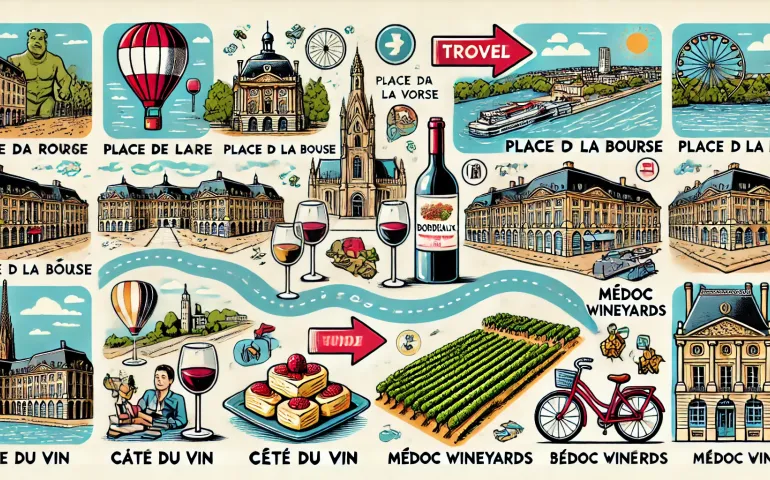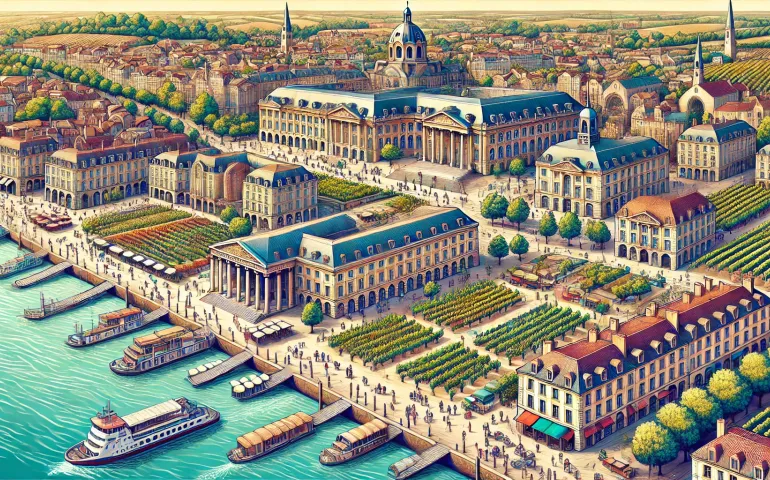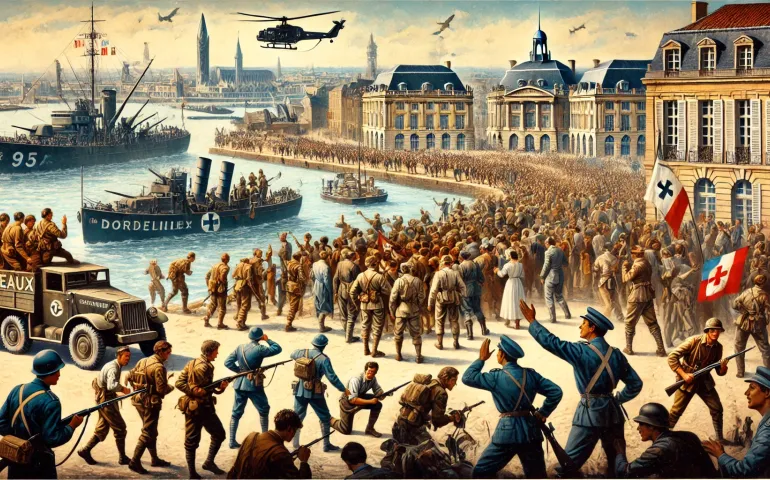About Place
- "The world's wine capital"
- "A city of art and history"
- "The Port of the Moon"
Reasons to Visit
- Renowned Wine Region : Bordeaux is synonymous with wine. It's home to some of the world's most prestigious vineyards, including Médoc, Saint-Émilion, and Pomerol. The Bordeaux Wine Festival and numerous wine tours and tastings offer an immersive experience for oenophiles.
- Architectural Marvels : Bordeaux's Port of the Moon, a UNESCO World Heritage site, is celebrated for its classical and neo-classical architecture. The Place de la Bourse, Grand Théâtre, and Cité du Vin are standout examples of its rich architectural heritage.
- Cultural Vibrancy : Bordeaux boasts a vibrant cultural scene with numerous museums, art galleries, and theaters. The city hosts events like the Bordeaux International Arts Festival and the Bordeaux Music Festival, ensuring a lively atmosphere year-round.
Visa
- From the United States, Canada, Australia, New Zealand, and Japan : No visa required for stays up to 90 days within the Schengen Area.
- From European Union countries : No visa required.
- From other countries : A Schengen visa is generally required. Specific requirements can vary, so it's advisable to check with the local French consulate.
Travel Expenses
- Travel to & from Bordeaux :
- Round-trip flights from major metro cities (e.g., New York to Bordeaux) - Approx. $600 per person.
- Total for two people: $1,200
- Hotel cost :
- Average cost per night: $150
- Total for 4 nights: $600
- Total for two people: $600
- Food cost :
- Average meal cost: $25 per person
- Total for 8 meals (lunches and dinners): $400
- Total for two people: $800
- Activity cost :
- Museum entries, wine tours, and day trips: Approx. $200 per person
- Total for two people: $400
- Near destination travel cost :
- Car rental and local transport: Approx. $100 per day
- Total for 4 days: $400
Total Estimated Travel Expenses : $3,400

Best Itinerary
Day 1 : Start your day with a visit to the Place de la Bourse and its stunning Miroir d'eau, the world's largest reflecting pool, from 9 AM to 11 AM. For lunch, try the local delicacy of duck confit at La Brasserie Bordelaise. In the afternoon, explore the Musée d'Aquitaine from 1 PM to 4 PM to dive into the region's history. Enjoy a leisurely stroll along the Garonne River in the evening, sampling macarons from Maison Georges Larnicol. Dine at Le Chapon Fin for an elegant French meal and wrap up your night with a visit to a local wine bar.
Day 2 : Begin your day with a tour of the Cité du Vin from 10 AM to 1 PM, learning about the world of wine through interactive exhibits. Have lunch at Le Café du Port, offering scenic views of the river. In the afternoon, take a wine tasting tour in the Médoc region from 2 PM to 6 PM. Return to Bordeaux for a dinner of seafood at Le Petit Commerce and conclude your day with a nighttime walk through the illuminated streets of the historic center.
Day 3 : Take a day trip to Saint-Émilion, starting at 9 AM. Visit the underground Monolithic Church and the King's Tower until noon. Lunch at L’Envers du Décor, renowned for its cozy atmosphere and wine selection. Spend your afternoon exploring the vineyards and partaking in tastings until 5 PM. Return to Bordeaux for a relaxed dinner at La Tupina, known for its rustic cuisine, and spend your evening enjoying a performance at the Grand Théâtre de Bordeaux.
Day 4 : Head to the Bassins de Lumières from 10 AM to 12 PM, an immersive digital art center. Lunch at Darwin Écosystème, a vibrant cultural space with a variety of food options. In the afternoon, take a bike ride through the Bordeaux countryside, visiting local chateaux and vineyards from 1 PM to 5 PM. For dinner, savor modern French dishes at Miles, and spend your night enjoying live music at one of Bordeaux’s jazz clubs.

Safety Tips
- Keep your valuables secure and be aware of pickpockets.
- Use reputable taxi services or public transportation.
- Avoid walking alone at night in unfamiliar areas.
- Stay hydrated and protect yourself from the sun during outdoor activities.
- Keep copies of your travel documents in a safe place.
- Learn basic French phrases for emergencies.
- Follow local news for any travel advisories.
- Be cautious with alcohol consumption.
- Use ATMs located in well-lit, busy areas.
- Respect local customs and dress codes, especially when visiting religious sites.
Flights
- Air France : Direct flight from New York to Bordeaux, approx. $600 round trip.
- Delta Airlines : One-stop flight from New York to Bordeaux, approx. $650 round trip.
- British Airways : One-stop flight from London to Bordeaux, approx. $200 round trip.
Hotels
- Hôtel de Sèze : Luxury hotel in the city center.
- Yndo Hotel : Boutique hotel with a unique style.
- La Maison Bord'eaux : Contemporary hotel near major attractions.
- InterContinental Bordeaux - Le Grand Hotel : Elegant stay with a historic touch.
- Hotel Burdigala Bordeaux : Modern hotel with excellent amenities.
Contacts
- Indian Embassy in Paris : +33 1 40 50 71 71
- Police : 112
- Ambulance : 112
- Firefighters : 112
Country
Closet Airport
- Bordeaux-Mérignac Airport (BOD)
Nearest City
- Paris
Heritage Sites
- Port of the Moon (UNESCO World Heritage site)
Airlines
- Air France
- Delta Airlines
- British Airways
- KLM
- Lufthansa
Currency
- Euro (EUR)
Languages Spoken
- French
Real Story
Cuisine
Bordeaux's cuisine is a delightful blend of traditional French gastronomy and local specialties. The region is famed for its rich and hearty dishes, often incorporating locally sourced ingredients. Duck confit and foie gras are staples, reflecting the area's penchant for gourmet flavors. Fresh seafood, including oysters from nearby Arcachon Bay, is a must-try, often enjoyed with a crisp white Bordeaux wine.
Bordeaux is also known for its canelés, small pastries with a caramelized crust and custard-like interior, flavored with rum and vanilla. These sweet treats are a perfect complement to the region’s robust red wines. The local markets, brimming with fresh produce, cheeses, and charcuterie, offer an authentic taste of Bordeaux’s culinary heritage.

Culture and History
Bordeaux, often hailed as the wine capital of the world, boasts a rich cultural tapestry shaped by its historical prominence and vibrant contemporary scene. The city's architecture is a testament to its glorious past, with the Port of the Moon, a UNESCO World Heritage site, showcasing classical and neo-classical buildings that line the Garonne River. The city's charm is further accentuated by its well-preserved 18th-century mansions, grand squares, and the iconic Place de la Bourse with its mesmerizing Miroir d'eau.
Bordeaux's cultural scene is dynamic, with numerous museums, theaters, and galleries. The Musée d'Aquitaine offers a deep dive into the region's history, from prehistoric times to the modern era, while the CAPC Museum of Contemporary Art features avant-garde works that attract art enthusiasts worldwide. The city's theaters, including the Grand Théâtre de Bordeaux, host a range of performances from classical operas to contemporary plays.
Festivals play a significant role in Bordeaux's cultural identity. The Bordeaux Wine Festival celebrates the region's viticultural heritage with grand tastings and events along the riverfront. The Bordeaux International Arts Festival and the Bordeaux Music Festival reflect the city's dedication to the arts, drawing visitors with diverse performances and exhibitions.
Gastronomy in Bordeaux is a cultural experience in itself. The city's culinary scene is renowned for its blend of traditional French cuisine and innovative culinary arts. Local markets, such as the Marché des Capucins, offer fresh produce, regional delicacies, and a glimpse into the daily life of Bordelais. Bordeaux's restaurants range from Michelin-starred establishments to charming bistros, all emphasizing the importance of local ingredients and fine wines.
Bordeaux's lifestyle is characterized by a balance of tradition and modernity. The city's commitment to sustainability is evident in its extensive network of bike paths and public transportation, making it easy for residents and visitors to explore its many attractions. The Garonne Riverfront, with its scenic promenades and green spaces, provides a tranquil retreat within the bustling city.
In essence, Bordeaux is a city where history and contemporary life harmoniously coexist. Its rich cultural heritage, vibrant arts scene, and dedication to wine and gastronomy make it a unique destination that captivates the hearts of all who visit.
